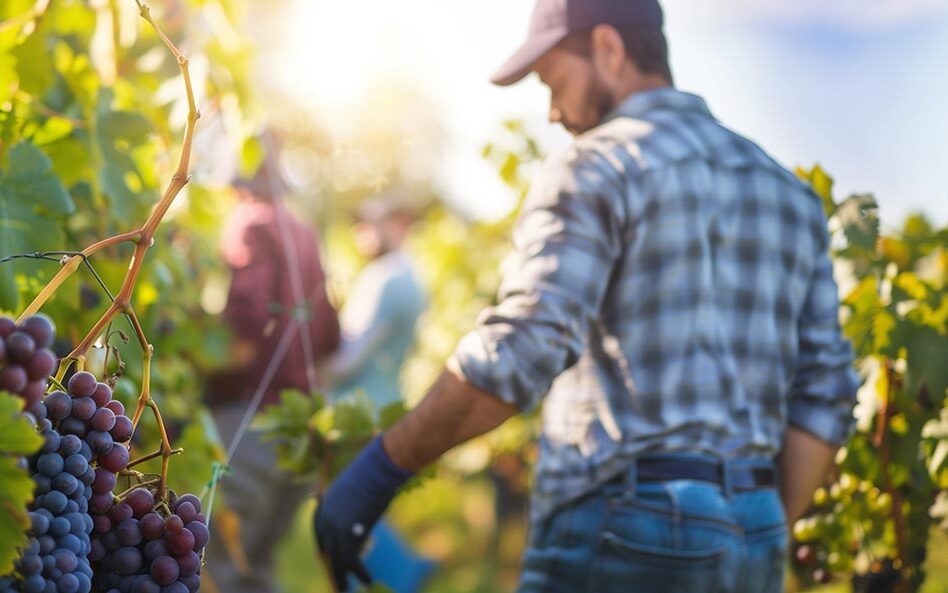

Ryan Robinson, Director of Education, Brescome Barton and Worldwide Wines, Advanced Sommelier-CMS, WSET Diploma and WSET Educator.
By Ryan Robinson, Advanced Sommelier-CMS, WSET Diploma and WSET Educator
Viticulture has always been an evolving dance between tradition and innovation. For many decades, growers have balanced nature and nurture, trying to grow the best fruit from their vineyards while making efforts to preserve the land that supports them.
Regenerative viticulture is a concept that is not just a trend but a full-scale revolution in how grape growers approach their craft in the vineyard. You might find yourself asking, what is regenerative viticulture? Is it just a new buzzword to help bolster wine sales? Unlike organic or biodynamic farming, which focus on eliminating synthetics and aligning with cosmic rhythms, regenerative viticulture goes deeper. It becomes a lesson that is not just about sustaining the land but also about revitalizing it to preserve for the future.
Regenerative viticulture aims to restore soil health, increase biodiversity and create self-sustaining ecosystems. Instead of treating the vineyard as a commodity that you put work into and get revenue out of, winemakers are embracing the idea that a vineyard should function like a living, balanced organism. The result is healthier vines, richer soils and potentially more money to be made with more expressive wines.
What does it involve? No-till farming to avoid soil erosion while maintaining microbial life. Cover crops and companion planting to build organic matter and attract beneficial insects. Compost and natural fertilizers to nourish the vines while avoiding chemical runoff. Livestock integration, such as sheep, goats and chickens, to naturally manage weeds and insects and to provide fertilizer. In short, it’s about minimal intervention by letting the vineyard regulate itself rather than relying on chemical aids.
This isn’t just a feel-good approach; the science supports it. Healthy soils have the capacity to store carbon, retain more water and are better resilient to climate extremes. In a time when unpredictable weather patterns are throwing curveballs at growers worldwide, resilience is powerful.
Like most revolutions, regenerative viticulture has its pioneers. Domaine Leflaive in France’s Burgundy region has been on the regenerative path for years, proving that world-class wines can be crafted with nature at the helm. In California, Tablas Creek Vineyard became the first winery in the U.S. to receive Regenerative Organic Certification, setting a new standard for sustainable practices. Across Europe, winemakers in Champagne, Bordeaux and beyond are slowly adopting regenerative methods. From this, growers are seeing the long-term benefits not just for the land but for their wines.
The million-dollar question: Do these investments make the wine better? While there’s no universal answer, many winemakers believe that healthier soils yield more vibrant, terroir-driven wines. The logic is straightforward. If the land is teeming with life, the vines can draw from a richer nutrient pool, producing fruit with greater complexity. With the reduced use of chemicals in the vineyard, the wines often show a purer expression of place.
There’s also a growing consumer interest in regenerative wines. Just as drinkers are now asking for low-intervention or at least natural wines, they’re also looking for bottles that use ethical farming practices. While the wine industry battles with the effects of climate change, soil depletion and consumer interest in natural wines, regenerative viticulture offers a practical, impactful solution. It’s more than just a farming method; it’s a philosophy that treats vineyards as ecosystems rather than factories.
The shift won’t happen overnight. The main challenges are cost and education. Industry-wide adoption will take time, but as more winemakers lead the charge, the proof will be in the glass. So, the next time you uncork a bottle, consider this: Not all wines are created equal, and some are working harder to heal the planet than others. Regenerative viticulture isn’t just about better farming, it’s about investing in a better future for
wine itself.
Ryan Robinson is the Director of Education for Brescome-Barton Inc., and Worldwide Wines in Connecticut, an Adjunct Professor at the University of New Haven, and is the Principal at SommCentric, a beverage education and consulting agency. He is a member on the USA Wine Tasting Team, representing the United States and the World Wine Tasting Championships and holds the credentials of Advanced Sommelier-CMS; WSET Diploma and WSET Educator in Wine, Sake and Beer; Rioja Wine Educator; VIA Italian Wine Ambassador; Wine Scholar Guild Educator and Italian and Spanish Wine Specialist; and Certified Scotch Whisky.



